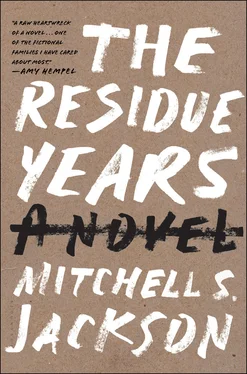Worked construction most of my life, and let me tell you, they just don’t build them like this anymore, he says. These days they pour a weak base, slap a few beams together, and tack up thin Sheetrock. Do it all in a matter of weeks. Used to be we’d take our time. Lay a thick slab of concrete, plaster the walls, drive a nail with the intent the beams would last. He falls back. But hey, it’s hard to find anything of character these days, he says. And that goes for house or human being.
Sir, I say, extra emphasis on the sir . I don’t know much about building a house, but I know how a home can make you feel.
Right, right, he says, and stands. You’re probably itchin to see what we’ve done.
We start in the basement, in the same back room where Bubba, my great-grandfather, used to collect his junk. Bubba was a heavyweight hoarder, believed that everything he touched deserved a second life. We (the we being my bros, my cousins, the neighborhood kids) spent hours rooting through what Bubba had saved to resurrect. The old junk room’s a hardware store now stocked with shelves of hand tools, and power tools with cords looped and tied. Nubuck belts hang against a wall, a massive metal cabinet is pushed in a corner. This is my sanctum, he says, sweeping his arm. A man has got to have a place that gives him peace.
He snaps his suspenders, snaps them joints the same way Bubba did. My great-grandpops wore the same thing every day save Sunday: a flannel shirt and gray slacks up near his navel. It was Bubba that did most of the disciplining back then. He had this way of standing, when he was about to soften a tough ass, with his head cocked and his thumbs hooked in the waist of his suspenders, that let you know he meant business. He’d seize you in one of his Nordic glares, make you kneel, lock your head between his legs, and ask if you knew why you were being punished. Then he’d tan your ass, open-hand, no belt, or with a thick black whip (a real whip!) so tough you wondered if he was working for honor.
But one thing about Bubba, he never exacerbated a mauling like Mama Liza, never said shit like, This is going to hurt me more than it hurts you, never proselytized: If I spare the rod I’ll spoil the child. Not him. He’d whoop you with heroic silence, then offer you the hankie forever folded in a pocket.
We wander into the basement’s main room. He shows me his wife’s potter’s wheel. This here is where she spends her time, he says, plucks a paintbrush from a handmade cup, and runs that dark thumb over the bristles.
We stroll past an ancient fridge and stove into the room where Mama Liza kept a contraption that dried fruit (you’ve never seen a family more stocked with raisins, prunes, and dates!), a room that’s empty now. When I was young, they kept the room decked with tweed couches that we’d stand on to watch the foot traffic: a man collecting shopping carts, a chick tottering home from a night on the stroll, grandmothers carrying jumbo Bibles into the storefront church next door.
He asks me if I’m ready to head upstairs.
We start in the kitchen. And this ain’t what it was. Gone the teacup wallpaper, the painting of The Last Supper , the decorative copper spoons, the sloppy white paint that sealed our cabinet drawers froze. They’ve refinished the cabinets, fastened them with bronze handles, laid tiles over our old Formica counters. Our fridge used to make the sound of a band warming up, but theirs could lullaby a nigger to sleep.
We hit the second floor. Stop in the room where Mama Liza and Bubba slept, a room they kept locked during the day and while they were gone. We meander into Uncle Sip’s old room next. Uncle Sip’s room stayed fragrant with cologne tester bottles he stole from the mall, was stacked with men’s fashion mags, stacks that, no matter how tall I got, were taller than me.
The husband asks what it was like growing up in the neighborhood.
What I could tell him about my Sixth Street crew. My homeboy from next door who was the king of all tumblers, who could backflip on command or challenge for a whole block. My other boy who lived in the cluttered house across the street, the one we all envied for his lax curfew. There was my boy, who was less of my boy, with the palsied arm, the last pick no matter what game we played. And there was the big homie Scoop, the most resourceful of us. Scoop was the one who knocked the bottom out a milk basket for a makeshift hoop, who built a go-cart we crashed wheeling down a steep hill.
I could tell him about the old homies, but what I say is, it was great. Lots of friends. Lots of good times.
Upstairs, they’ve pulled up the carpet in the hall and laid down hardwood. Upstairs, he takes me into the bathroom. The claw-foot tub (it’s refinished) that I’d bathe in for school still takes up most of the space, but otherwise the bathroom’s revamped: a recessed fan where the old bulb hung, new sink and porcelain toilet. We head into Mom’s old room, which is now a shrine of trophies, helmets, mitts, balls, a pair of grubby baseball cleats encased in glass. We roam the rest of the floor and the attic, which ain’t an attic no more, him pointing out this and that, calling out types of woods and metals, the names of manufacturers. Did most of the work myself, he says, and please believe you never seen a man more proud.
There’s piano music playing when we get downstairs. It lures both of us into the same nook where Mama Liza would lie on a couch and demand I tweeze stubborn hairs out her chin, where us kids were forced into torturous hours of song, prayer, and Bible verse recitation. The wife fingers a piano that looks like our old one. She asks if we had one when we lived in the house, tells me it was left inside when they bought it.
We did, I say.
Then we owe you thanks, she says. Thank you.
They walk me out together. We hope this was all you hoped it would be, he says. They stand on the porch and watch me leave.
For Mom and my bros, for my girl, for Uncle Sip, for my aunt if ever she needs, even a room or two for my cousins who never reside too far from grief, if I can buy this, when I reclaim what by ethic is ours, there will be rooms for the whole battered bunch of us. The owners, yes, they were cool, but they must be told — it takes more than hardwood floors and paint, more than tile and granite, more than a new keyed key; they must know it takes more than a deed and mortgage for a house to become your home.
What you got, some big old plan?
— Grace
There ain’t a merciful bone in his body, the way he struts in my job full of himself and some. The way he tarries inside the door looking around, the way he finds a free space for his bigger, swollen self, and, till the front counter clears, plays as if fixing his shirt is what matters most in the world.
Afternoon, Grace, he says, strolling up.
Most of the years we were together, Kenny wore Jheri curls, wore velour tracksuits and tenny shoes, but this newfangled Kenny wears a low fade, tailored suit, and glasses never sold as two-for-one.
Good afternoon, I say. What’s up?
How you been? he says.
Blessed, I say.
So this, he says, it what they call blessed.
That a joke? I say.
Came to rap to you a second, he says. Can we? Won’t be but a hot second. I promise.
I ask my coworker to watch my till, find an empty booth. You can see that he’s losing his hair. So when you start wearing glasses? I say.
It’s been a minute, he says. But only to work. When I need whitey to take me serious. He takes off his frames and blows on the lenses. So here’s the deal, he says. Christmas, me and Helen taking the boys to Hawaii.
He sweeps straw scraps and shredded cheese off the table.
Читать дальше












